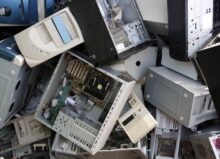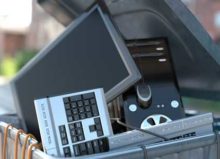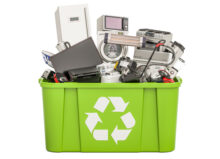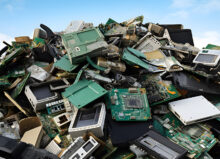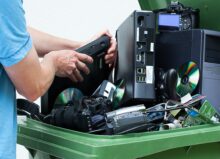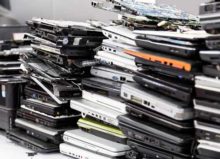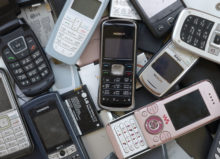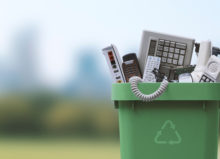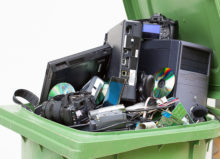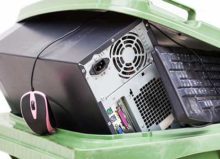Guide to Recycling Batteries: Lithium-Ion, Household, & Car Batteries
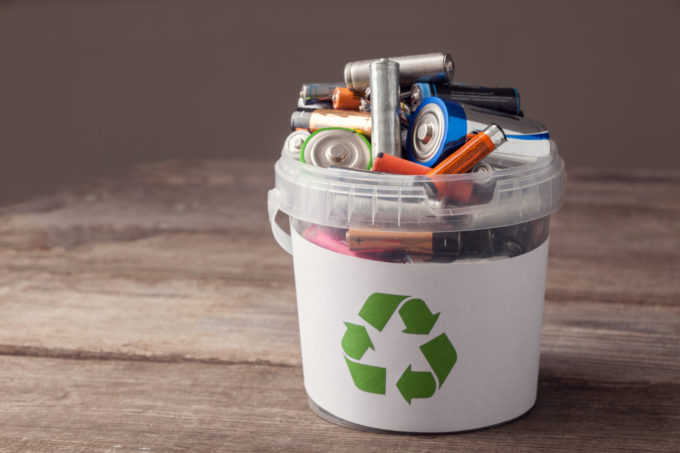
When batteries are thrown into landfills, they leach toxic chemicals like cadmium, lithium, and lead, into the soil. These poisonous substances will eventually infiltrate nearby streams and rivers. Additionally, many of these substances can even pollute the air. That’s why you should opt for battery recycling.
Nowadays, recycling batteries has never been easier. In this guide, we’ll cover what you should do with your old batteries, and highlight just how easy it is to recycle lithium-ion, car, and household batteries.
What Should You Do With Old Batteries?
Single-use and rechargeable household and 9-volt batteries should be inspected for signs of leakage before storing them for later recycling. If white, powdery residue is visible anywhere on a battery, this indicates it’s leaking, and needs to be properly disposed of as soon as possible. An experienced battery recycling center can help you with this, but we’ll get to that in a moment.
Let’s discuss how to recycle different types of batteries, because they all have unique recycling guidelines.
Recycling Lithium-Ion Batteries
First, there are two types of lithium-ion batteries: single-use and rechargeable. If you’re not sure whether or not they’re lithium, check the battery itself. Sometimes the words “lithium” will appear on the cell. If the battery is in a cell phone, camera, watch, or tablet, it’s most likely a lithium-ion battery.
If you opt to recycle your lithium-ion batteries, you should always work with a professional recycling center. This is because recycling lithium-ion batteries involves disassembling the battery, separating reusable components, and reprocessing these units into new cells.
When storing your old lithium-ion batteries, we recommend placing each battery in a separate plastic bag and covering the battery’s terminals with electrical tape or other non-conductive tape. If your battery is punctured or leaking, you should contact a recycling center as soon as possible.
Recycling Car Batteries
Car batteries should always be handled with care. In fact, for any medium or large-scale batteries, we recommend contacting the lot that you purchased your vehicle from. Car batteries should not go in your regular trash or recycling bins. If you can’t remember where you purchased your vehicle from, or your dealership doesn’t know what to do with the battery, you should contact a recycling center that specializes in battery recycling.
The first phase of car battery recycling consists of breaking the battery into tiny pieces using a hammer mill, collecting sulfuric acid from the battery, and then separating materials. Battery chunks are placed in a corrosive liquid that forces plastic pieces to float to the top and lead pieces to sink to the bottom. This facilitates the recycling of plastic and lead so that battery manufacturers can reuse these materials. Car battery recycling also includes the neutralization and conversion of sulfuric acid into a safe, powdery substance often found in textile and glass products.
It’s also important to note that when storing vehicle batteries, you should place them in heavy-duty trash bags to prevent exposure to fluid leaks, and always store them in a cool and dry place. Lastly, when transporting your car batteries, always place them upright. Some vehicle batteries leak acid through vent caps if they are stored upside down or sideways.
Recycling Household Batteries
Household batteries include:
- Alkaline & Zinc-Carbon (A, AA, & AAA)
- Button-Cell (Hearing aids)
- Lithium (Single-Use) 9-Volt Batteries
- Rechargeable Batteries (Nickel-Cadmium, Lithium-Ion, Nickel-Metal Hydride, & Nickel-Zinc).
Even small household batteries can contaminate soil and water around landfills. These batteries should always be taken to a recycling center like High Tech Recycling for proper disposal.
Why Is It Bad To Throw Batteries in the Garbage?
It takes approximately 100 years for batteries to fully decompose in landfills. Over that century, batteries will continue leaching dangerous substances into the soil, water, and air.
Additionally, batteries that are left to decompose in landfills undergo chemical reactions that release toxic gas emissions. These emissions increase the ozone layer, thus contributing to global warming.
Lastly, chemicals released into the soil by batteries can ultimately contaminate water supplies, kill plants, and detrimentally disturb local ecosystems.
Benefits of Recycling Batteries
- Reduces Damage from Landfills: Landfills are one of the top producers of methane discharge in the United States. Household and car battery recycling can help reduce the size of landfills and the amount of methane released into the atmosphere.
- Reduces Carbon Footprint: Air, land, and water contamination caused by old, disposed batteries has significantly contributed to global warming, increased incidences of impurities in drinking water supplies, and corrupted soil. Battery recycling, along with e-waste recycling, is one of the best ways to reduce our carbon footprint and improve the health of the planet.
- Saves Energy: Massive amounts of natural resources are needed to make batteries. Recycling batteries for reusable materials diminishes our reliance on finite energy sources.
- Creates Jobs: Battery recycling isn’t a simple task; it requires trained individuals to complete the job from disassembling to neutralizing to ensuring that recycled materials are sent to the right manufacturing facilities for reuse.
How To Find a Recycling Drop-Off Location
Doing a Google search for “recycling centers near me” or typing your zip code on the Earth911 website can quickly tell you where the nearest battery recycling facility is to your location. You might also call your county Department of Health or City Hall for information about local recycling centers. Some recycling centers accept only certain types of batteries, so ask the center what they accept before dropping off batteries.
If you live in the Detroit, MI, area (including Oakland, Macomb, and Wayne counties), contact High Tech Recycling.
Learn More From High Tech Recycling Today
High Tech Recycling has offered safe and reliable battery recycling services since 2011. You can either schedule a pick-up or drop off your old batteries to our location. If you’re recycling an old phone or electronic device (including the batteries), we also provide data destruction services.
If you have questions about what we do, or you would like to request a pick-up time, please fill out our online form today.

